The Elderly
That the elderly, sustained by families and Christian communities, may apply their wisdom and experience to spreading the faith and forming the new generations.
For more information, visit the Apostleship of Prayer.
For more information, visit the Apostleship of Prayer.
“Preach the Gospel as you go for the streets!” ―Poor Friars Motto
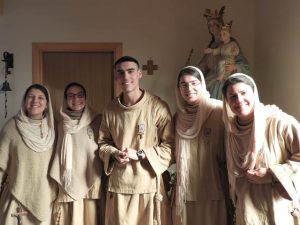 There is a new community in the diocese of Houma/Thibodaux in Louisiana whose members can be seen hitchhiking around the highways and byways of the diocese.
There is a new community in the diocese of Houma/Thibodaux in Louisiana whose members can be seen hitchhiking around the highways and byways of the diocese.
The Little Friars and Little Nuns of Jesus and Mary, also known as the Poor Friars, were founded in Italy and recognized as a Public Association in 2014. They have the Franciscan spirit of poverty and evangelization, and the Carmelite spirit of contemplation and prayer in their cloisters, but have their own unique Rule of Life.
There are many in the world today who do not give serious thought to the Church because of a perceived worldliness in its members and clergy. Where is the poverty of Christ? There are many shining examples among bishops, priests, religious and the laity. But in our day, when people do not notice simple signs of sanctity and heroism, a sometimes more dramatic image must be revealed. This is what the Poor Friars are: a sign of contradiction in our self-absorbed and self-centered culture; the embodiment of true dependence on God for the basic needs in life, as given freely through strangers and neighbors in encounters that change lives forever.
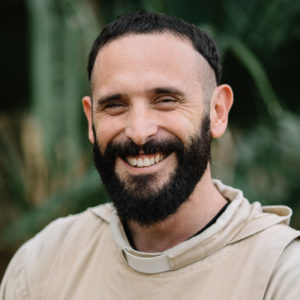
They personally cannot accept money at all. They also do not own cars so they hitchhike everywhere. “This is where our Apostolate shines,” says Fr. Antonio Maria Speedy, American Provincial, “as while in the vehicle with the people, we invite them to the Sacraments of Confession and Holy Communion.”
Women and men make up the community though they live separately. They minister in four Italian dioceses. In 2010, they were invited by the local ordinary to begin the process of establishing a community in Louisiana. Father Antonio Maria is the chaplain to the Diocesan Office of Evangelization and the Administrator of two parishes.
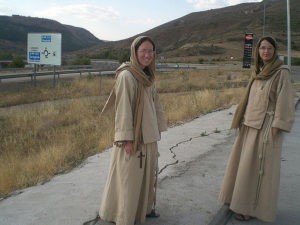 Here is a description from their website for their reason for being (raison d’être), all the more penetrating because of the charm of the language translated from the Italian!
Here is a description from their website for their reason for being (raison d’être), all the more penetrating because of the charm of the language translated from the Italian!
Today all the world or many, many people in effect have the need to see real poor of the Lord in the Church, because they no longer understand the Benign Mystery of its Glorious Richness; instead of esteeming it they accuse it!, and not only, they also accuse unjustly its Ministers that represent it.. , . instead of becoming nearer they go further ! For this was immediately born the urgency to make ourselves truly poor, so the confused people, in regards to the so called wealth of the Church, no longer having the possibility to point the finger at us, given that they see us extremely poor, they stop, and finally listen to the demonstrated Truth and the simple answer as to why Jesus was poor while now the Church is (rightly ) Rich, and etc.. etc.. ; and like this in fact many, begin to take up again the esteem for their Mother Church and for her Ministers, returning like this to the Holy Confession and to the Holy Communion, and therefore concretely: be on the way towards the Blessed Eternal Life. Amen !
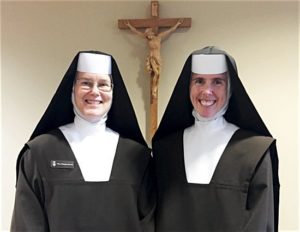 Two Sisters from the Carmelite Sisters of the Most Sacred Heart of Los Angeles came from opposite coasts for a recent Come & See weekend in Saint Paul, Minnesota. Sr. Elizabeth Therese, O.C.D., and Sr. Catherine Marie, O.C.D., live in Alhambra, CA, and Miami, FL, respectively, but have their roots in Minnesota. God’s call is not limited to state boundaries and each sister discerned that God was asking them to leave their home and kinfolk to find their fulfillment as spouses of Christ in the Carmelite community in Alhambra, California. (See article)
Two Sisters from the Carmelite Sisters of the Most Sacred Heart of Los Angeles came from opposite coasts for a recent Come & See weekend in Saint Paul, Minnesota. Sr. Elizabeth Therese, O.C.D., and Sr. Catherine Marie, O.C.D., live in Alhambra, CA, and Miami, FL, respectively, but have their roots in Minnesota. God’s call is not limited to state boundaries and each sister discerned that God was asking them to leave their home and kinfolk to find their fulfillment as spouses of Christ in the Carmelite community in Alhambra, California. (See article)
Sr. Elizabeth Therese is the vocation directress and slowly realized her vocation from interactions with a campus ministry, a third order Carmelite group, Adoration and monthly discernment dinners. She also was engaged to be married. Though, “it’s not until you have a personal relationship with the Lord, whether you’re called to religious life or marriage,” she said. “that you’re going to be able to know what your vocation is.”
Sr. Catherine Marie felt her call through the Eucharist and Adoration. A teacher, she immediate felt that she had come home once she visited the Carmelites in Alhambra. “It was as if Jesus was saying to me, ‘Welcome home, I have been waiting for you.’”, she said, “Inside my heart I felt myself responding, ‘Finally, I am home.’”
A stumbling block for Sr. Catherine Marie was her educational debt. But thanks to The Labouré Society, located in Eagan, MN, she was able to raise the money to pay off the balance. Sister advises: “Do not be afraid to say, ‘yes’ to Christ,” she said. “He takes nothing away and gives you everything your heart could desire.”
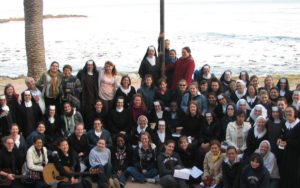 If you live in the California area, please consider becoming part of Handmaidens, a faith formation group for single women between the ages of 18 and 35, dedicated to cultivating a deeper relationship with the Lord, as well as a greater understanding and appreciation of the dignity of their vocation as women. Formation and living holiness in the world is supported and nurtured through adoration, prayer and conferences given by the Carmelite Sisters and chosen laity.
If you live in the California area, please consider becoming part of Handmaidens, a faith formation group for single women between the ages of 18 and 35, dedicated to cultivating a deeper relationship with the Lord, as well as a greater understanding and appreciation of the dignity of their vocation as women. Formation and living holiness in the world is supported and nurtured through adoration, prayer and conferences given by the Carmelite Sisters and chosen laity.
The next meeting date is November 18, 2017.
That Christians in Asia, bearing witness to the Gospel in word and deed, may promote dialogue, peace, and mutual understanding, especially with those of other religions.
For more information, visit the Apostleship of Prayer.
Senator Ben Sasse has written a new book called The Vanishing American Adult. I highly recommend it, especially for those of us concerned about the future of religious life in America. The book is a diagnosis and prognosis of the current situation of the youth in America. He doesn’t lay blame on American kids but mainly their parents for protecting them from challenges that will help them become adults. Adulthood is not just a biological stage but something to be earned. In the past, it was what we all needed to learn, whether or not we liked it. This is not the case anymore. Our culture endorses prolonged adolescence, upholding baby 40-year-olds.
Adults are responsible and virtuous as good citizens and members of the Church. They make tough decisions and take responsibility for their decisions. They are not passive but active. Senator Sasse’s book is important for those of us concerned with Religious Life because becoming a religious takes the virtues of an adult, putting away childish things. With the vanishing of the American adult, the Republic will not only suffer but also the Church, especially religious life.
Pray for parents. It is difficult to raise children in today’s culture of the vanishing adult. Unlike any time in history, the culture is raising kids more than the parents, undermining parental authority. Parents should be supported and encouraged to actively raise their children into the virtues. Senator Sasse gives some helpful advice on what he and his wife are doing for their children. Read his book and take his advice.
On November 21 (the Presentation of the Blessed Virgin Mary in the Temple), the Church will celebrate World Day of Cloistered Life, also known as “Pro Orantibus” Day, which is a Latin phrase meaning “for those who pray.” This is an important ecclesial event for all Catholics worldwide to commemorate the hidden lives of consecrated religious in cloisters and monasteries.
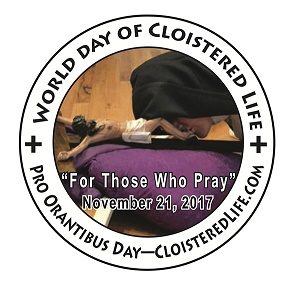
We celebrate this day because the contemplative life is a gift from Almighty God to us all — all the world benefits spiritually from the prayer and sacrifice of these dedicated and faithful souls, even when we may not know it. On this day, the faithful are encouraged to reach out to the cloistered and contemplative communities in their diocese, through prayer, encouragement, and material support.
Please click at the link for more info and for resources: //www.cloisteredlife.com/news/pro-orantibus-day/
That all workers may receive respect and protection of their rights, and that the unemployed may receive the opportunity to contribute to the common good.
For more information, visit the Apostleship of Prayer.
 Most of us recognize the beauty of the religious life. For most, the beauty of monasticism stands out. But its other forms us as beautiful as well because love is the motivating center. But why is the religious life beautiful? In order to answer that question we should first list the classical criteria of beauty. Thomas Aquinas says three things are necessary for beauty:
Most of us recognize the beauty of the religious life. For most, the beauty of monasticism stands out. But its other forms us as beautiful as well because love is the motivating center. But why is the religious life beautiful? In order to answer that question we should first list the classical criteria of beauty. Thomas Aquinas says three things are necessary for beauty:
First, (1) integrity or perfection, for things that are lacking in something are for this reason ugly; also (2) due proportion or consonance; and again, (3) clarity, for we call things beautiful when they are brightly colored.
Since Christ is Love made visible and religious life is conformity to Christ, religious life is a continuation of that love made visible in Christ. Love is perfect, showing forth integrity (1). There is no lack. It is the perfection of all things. It is harmonious and proportionate (2). It does not undermine a(they part or add superfluity. The parts are united into a harmonious whole (order). Lastly, it shines forth (3). It communicates itself, bringing others into its life.
If religious life is an intense participation in the Christ life which is Love, it will meet these three criteria. In an age full of thrills but lacking in beauty, Dostoyevsky’s prophecy that “beauty will save the world” needs to be taken seriously. Taking into consideration what was said above, then it makes sense to say the beauty of the religious life is integral to saving the world because in and through it Christ is encountered.
 Why did the early Church accept some strands of Greek philosophy and not Greek mythology as a whole? Both had a theological worldview, one possibly more specific than another. It was not as if philosophy was simply within the realm of reason yet as one step to faith, but Greek philosophy already had a more or less distinct vision of God and man according to which the soul ought to conform. Accordingly, Plato’s Academy was more like a monastery (seeking God) than today’s university (seeking Information). Not only were ancient philosophical schools for discovery and contemplation, but its practices were integral to the end of union with God. While not the fullness of Revelation, philosophy manifested aspects of the truth, whereas, the mythological worldview contradicted Revelation, presenting a false image of God and man, i.e. idolatry.
Why did the early Church accept some strands of Greek philosophy and not Greek mythology as a whole? Both had a theological worldview, one possibly more specific than another. It was not as if philosophy was simply within the realm of reason yet as one step to faith, but Greek philosophy already had a more or less distinct vision of God and man according to which the soul ought to conform. Accordingly, Plato’s Academy was more like a monastery (seeking God) than today’s university (seeking Information). Not only were ancient philosophical schools for discovery and contemplation, but its practices were integral to the end of union with God. While not the fullness of Revelation, philosophy manifested aspects of the truth, whereas, the mythological worldview contradicted Revelation, presenting a false image of God and man, i.e. idolatry.
The Church still struggles with competing mythologies about God and man. Currently, she clashes with many modern idols of God and man, seeking to remake all things in its basic image and likeness. Such an idol destroys man because it doesn’t manifest the truth, making him a slave. Modern philosophy very often is at the service of such idols, but like Moses it should destroy them. If you want a revitalization of Catholicism, pray for a revitalization of philosophy that it may return and follow the example of the midwife of Wisdom, Socrates. Like Moses, he was an idol smasher, namely, smashing the idols of the city. He paid for it with his life. I think that after the smashing he would have been open to the Revelation of the true God, thus making him someone who would have been close to the Lord. Erasmus echoed the Church Fathers by loosely designating Socrates a saint. They were on to something, i.e. the marriage of philosophy and the Word. Pray for a revitalization of philosophy because when that suffers the Word suffers.
When I lived in Washington D.C. there was a group of nuns that accomplished everything. They were the hardest working people in the city. I once asked them how do they find the time to accomplish all of their work and still find time for other things. Their simple answer was prayer. Taking the time to pray focused them not only on God but on the task at hand. They were not prone to the million little distractions many of us go through because the act of praying disciplined their attention. Many of us do not work well because our hearts are divided. Kierkegaard said that purity of heart is to will one thing. Part of the ascesis of the religious life is learning how to will one thing, ultimately the will of God.
Many companies struggle to keep their employees focused, especially if the work is on the computer. The internet has presented innumerable distractions. It almost seems to be made for distraction. I have never talked to someone who said the internet has made them more focused. On the other hand, almost every gardener tells me that gardening actually makes them focused, bringing them a sense of calm and confidence. Eden was a garden and Adam a gardener. Internet work seems to make the modern Adam anxious and frazzled. This might be the reason I have never met a religious order that makes working on the internet their main apostolate. It might lead to some very unhappy nuns.
Looking at the ways religious orders order their lives is necessary when the dominate way of life lacks any coherent order. Many social commentators agree that we live in a “Anxious Age”, an era that is leading many people to depression. Often this is found within technologically advanced countries. Some technologies are supposed to help people accomplish their work quicker and free up some time in their schedules. However, most people are overwhelmed and have no leisure time whereas the nuns who did not use many technologies to speed up their work had all the time in the world to pray and enjoy leisure. Now is the time to actually look at how religious order spend their time and what is key to their success in making time.